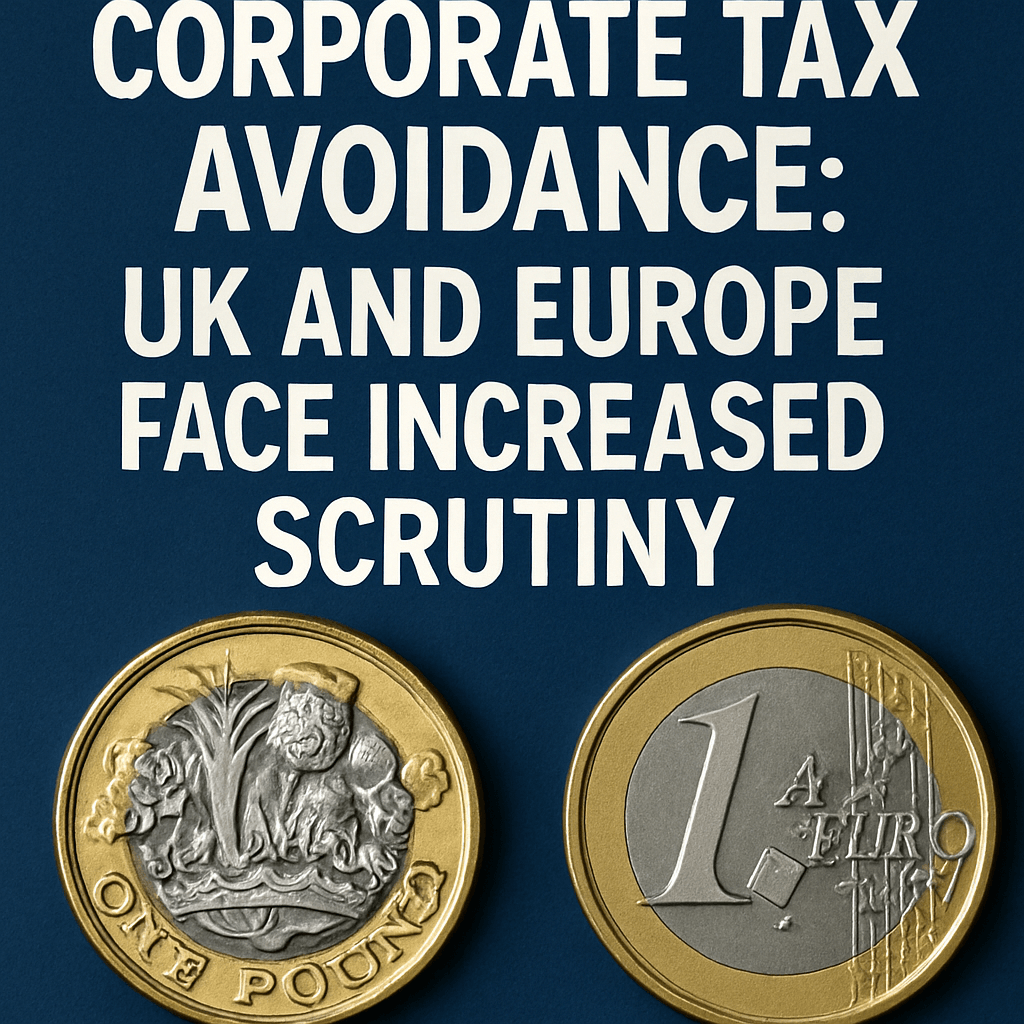Corporate Tax Avoidance: UK and Europe Face Increased Scrutiny

Key Findings of the State of Tax Justice 2024 Report
According to the State of Tax Justice 2024 report by the Tax Justice Network, governments worldwide are losing an estimated €416 billion ($492 billion) annually to profit shifting by multinational corporations and offshore tax arrangements for high-net-worth individuals. This figure is based on a combination of bilateral trade data, financial statements from the Bureau van Dijk Orbis database, and macroeconomic modelling from the IMF.
The report highlights that Europe and its associated jurisdictions are collectively responsible for over 70% of global corporate tax base erosion risk. The UK, together with its Overseas Territories and Crown Dependencies, alone account for 26% of the total.
Understanding the Corporate Tax Haven Index (CTHI)
The Corporate Tax Haven Index (CTHI) is designed to quantify how jurisdictions facilitate profit shifting. It combines:
- Scale of financial activity (Global Scale Weight)
- Aggressiveness of tax regimes (Haven Score)
- Data-driven estimates of profit re-allocation
Each jurisdiction receives a composite score. A higher CTHI indicates a greater impact on global tax avoidance. The 2024 ranking shows:
- British Virgin Islands: 2 469 points
- Cayman Islands: 2 456 points
- Bermuda: 2 403 points
- Switzerland: 2 279 points (highest outside UK network)
- Netherlands: 1 945 points (highest in EU)
“The CTHI uses public and proprietary datasets to map flows of intangible profits. It’s a crucial tool for policymakers,” explains Dr. Elena Martínez, Senior Tax Economist at the IMF.
Tax Risk Profiles in Major European Economies
UK and Its Overseas Network
- CTHI Share: 33% of global avoidance risk
- Top three territories account for 19.7% alone
- UK domestic score: 894
EU Member States
Among the EU’s top five economies:
- France: 883 CTHI
- Germany: 590 CTHI
- Spain: 557 CTHI
- Italy: 342 CTHI (strongest performance)
Switzerland and Other Jurisdictions
Switzerland’s higher-than-EU score reflects its cantonal tax competition. Luxembourg, Ireland, and Cyprus also feature prominently due to patent-box regimes and advance tax rulings.
Haven Scores and Regulatory Opacity
The Haven Score measures how legal frameworks facilitate avoidance. In 2024:
- Eight UK-linked jurisdictions scored the maximum of 100
- Switzerland: 89
- Ireland & Cyprus: 79 each
- Portugal: lowest in Europe at 46
A high Haven Score often correlates with extensive use of intellectual property boxes, capital allowances, and treaty shopping.
Statutory vs Documented Lowest Tax Rates
The Lowest Available Corporate Income Tax Rate (LACIT) reveals discrepancies between headline rates and effective rates achieved via incentives:
- Luxembourg: 24.9% statutory vs. 0.3% LACIT
- Switzerland: 19.7% vs. 2.6%
- Ireland: 12.5% vs. ~0%
- Malta: 35% vs. 5%
- Netherlands: 25.8% vs. 5%
Such gaps are enabled by patent-box regimes, hybrid mismatch arrangements, and controlled foreign company (CFC) rules.
Latest Regulatory Developments
In 2023–24, the OECD’s Two-Pillar Solution moved toward implementation:
- Pillar One: Re-allocation of residual profits
- Pillar Two: Global minimum tax at 15%
Additionally, the EU’s Directive on Administrative Cooperation (DAC7) has expanded reporting requirements for digital platforms, with enforcement scheduled for 2025.
Impact on Emerging and Developing Economies
Lower-income countries lose an estimated €100 billion annually due to profit shifting, according to UNCTAD. Limited audit capacity and narrow tax treaties exacerbate vulnerabilities. Tax Justice Network recommends:
- Strengthening Beneficial Ownership Registers
- Capacity-building via IMF technical assistance
- Reforming global tax governance at the UN level
Technology-Driven Transparency Solutions
Blockchain analytics firms (e.g., Chainalysis, Elliptic) now track on-chain flows of digital assets, revealing profit shifting into crypto-enabled havens. Machine learning models applied to customs and invoicing data can flag trade mispricing in real time.
Conclusion
The State of Tax Justice 2024 underscores that tackling corporate tax avoidance requires multilateral cooperation, stronger disclosure standards, and innovative data analytics. As OECD reforms take hold, pressure will mount on high-risk jurisdictions to close loopholes and align with global norms.